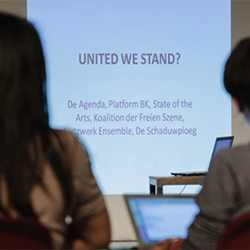How fair are the pay and conditions in the arts sector? And how sustainable are our working practices? Anne Breure, artistic director of Veem House for Performance argues that a Fair Practice Label is needed in the arts. This will be the subject of a session she is running with Het Transitiebureau (Anoek Nuyens, Lara Staal and Marijke Hoogenboom) on 16 April during IETM Amsterdam. Breure: ‘Things are looking great at the front end of the arts sector, but the back end is on the point of collapse.’
What exactly should we understand by a Fair Practice Label?
‘In our art, in our performances, we express a lot of – shall we say, progressive – values. Values like, humanity, justice, beauty, sustainability. The question is, how do you go about applying the values you express in your art in your own working practices? How do you unite aesthetics with ethics? A Fair Practice label would be a way of establishing our common values as a sector – about fair pay, fair working conditions, fair distribution of funds, green production methods, etc. Introducing a label would make a joint statement about what you stand for. It’s about practising what you preach. It would help you to answer questions like, is it acceptable not to pay someone for the first four years after they’ve finished their training? If an artist says “I’ll do it unpaid” should you say “Okay”?’
Why do you think a Fair Practice label is important now in particular?
‘A year ago the VVD [conservative liberal party] was saying, “Just look how well the arts are doing! They’re still flourishing, in spite of the cutbacks.” And it’s true if you’re looking at the front end – the arts are still looking bright there. Ever since the huge cuts four years ago everyone in the sector’s done their best to show how valuable we are: We’ve been saying, “We’re relevant, what we do is important!” But the recent report by the SER [Social and Economic Council of the Netherlands] on working conditions in the cultural sector shows what things are like at the back end. Most artists are self-employed and earn well below the average wage. The working conditions are just plain bad. In the field I work in, a turnover of less than 15,000 euros a year is more the rule than the exception. In short, the back end is on the brink of collapse. The whole system is falling apart.’
How would a Fair Practice Label help?
‘After the furore over the SER report, Jet Bussemaker [Minister of Education, Culture and Science] handed over two million Euros. Fine, but it’s also an absurd response, of course. It not a sustainable solution at all. I think we should be saying that if we want to have arts at this level, there’s got to be regular funding. Or we have to do less. The artists themselves are the biggest arts funders at the moment. In this respect, the SER report confirms what we’ve known for a long time ourselves in the arts. In the long term I’d like to see a Fair Practice Label being incorporated into funding applications. That way you could show how much money you need to make art sustainably and what it means to produce art according to our collective values: If we’re going to adhere to these values, this is how much it’s going to cost. It’s important as a sector – including everyone from the policy maker to the beginning artist to the manager of a top-level arts organisation – that we first discuss these values and use them as a basis for defining the label.'
What can people expect from the session on this subject on 16 April?
‘The session should be of interest – and I believe important – to artists, arts student and curators as much as to policy makers and the staff of funding bodies. In fact it’s aimed at anyone who cares about the arts. There’ll be a discussion and several European speakers will talk about their best practices and share their outlook on the matter. For example, Robrecht Vanderbeeken from State Of The Arts in Belgium will be there. A Fair Practice Label has already started up in Belgium. Vanderbeeken wrote an interesting article on it in the Zwart/Witboek published by Het Transitiebureau and [Belgian cultural magazine] Rekto:Verso. I hope we’re going to be taking steps towards formulating shared sectoral values, perhaps even at European level.'
What values would you definitely include in the label?
'To me the most important value is sustainability. Sustainability should be a fundamental driver in the arts – I mean sustainability both in terms of employment and organisation and in terms of climate. At the moment you’re seeing see that as a sector we’re very much working from one project to another, or – in the case of organisations with regular funding – in four-year periods. I think it’s time to get together to consider how we view the arts in the long term. How can we ensure sustainable practice that’s good for people and for the planet?'
More information
‘Fair practice label in the arts’
16 April 2016 - 13:00 to 15:00
Stadsschouwburg Amsterdam
During the IETM Amsterdam Plenary Meeting 2016
Moderator: professor Marijke Hoogenboom, Performing Arts in Transition Research Group

